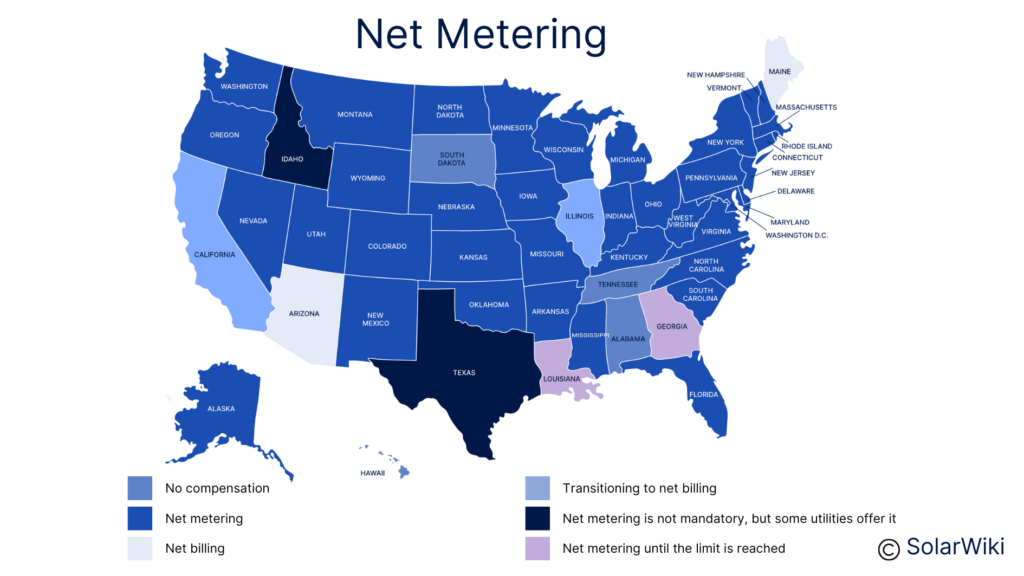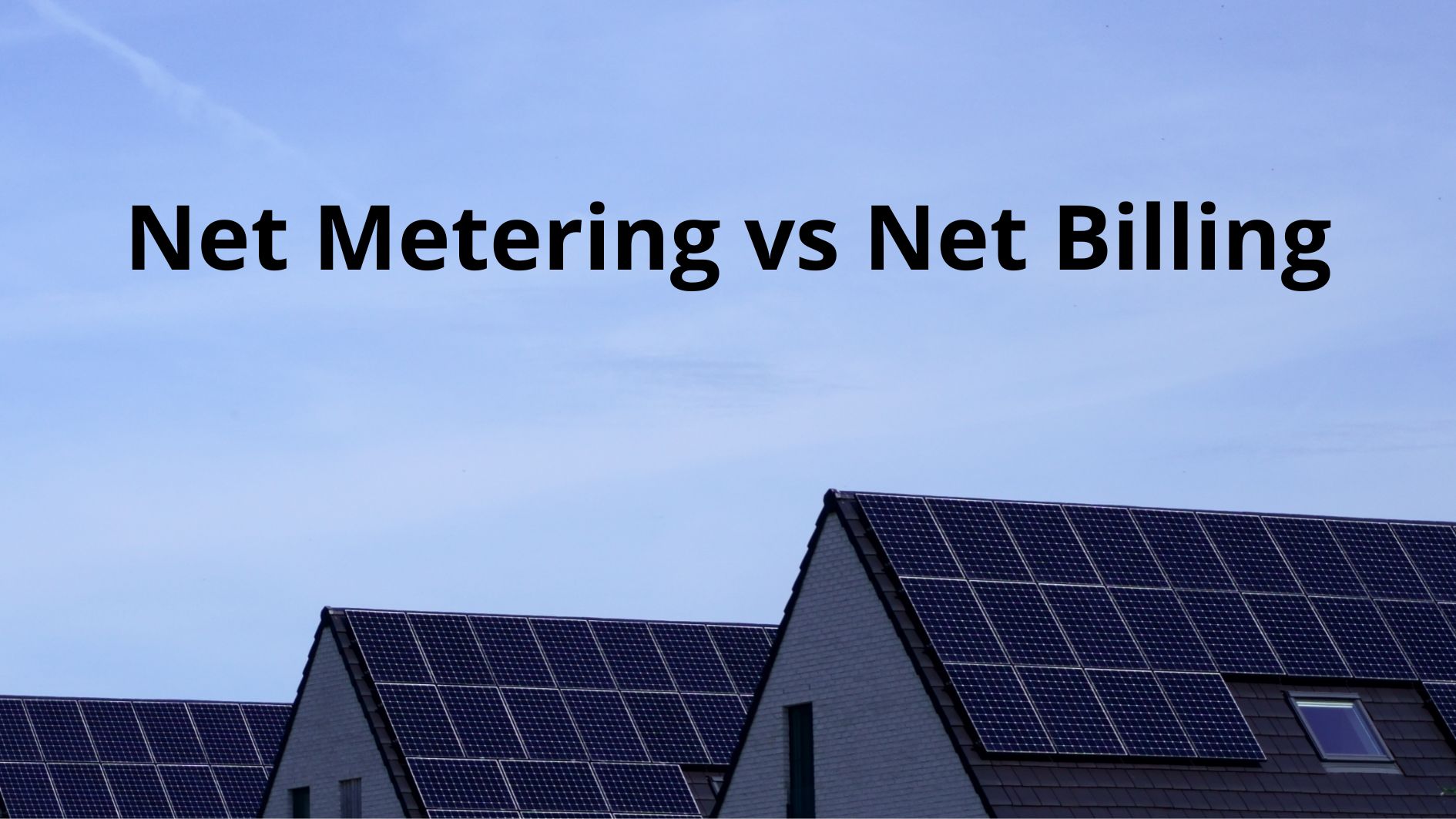Image source: Canva.com
Net billing and net metering are common methods for compensating solar energy system owners for surplus electricity sent back to the grid. This article will explore the key differences between net billing and net metering, helping individuals choose the best option based on their personal circumstances and energy objectives.
Net Metering vs. Net Billing
Net metering and net billing are distinct systems for compensating solar energy system owners for excess electricity sent to the grid. The key difference lies in how compensation is calculated. Net metering typically provides credits equivalent to the retail rate of electricity (what you pay as a utility customer), whereas net billing credits are based on the wholesale rate (what the utility company pays).
What is Net Metering?
Net metering is a billing system that ensures you receive credit for the electricity your solar panels produce and send back to the grid. When your solar system generates more power than you use, the excess electricity flows onto the grid, and your electricity meter tracks this by spinning backward. This process reduces your overall electricity bill.
Net metering allows you to use energy from your solar panels during the day and draw from the grid at night or when your solar output is insufficient.
How Does Net Metering Work?
To connect your solar system to the grid, special equipment and utility permission are required. Your solar company will handle the necessary paperwork and permits. This may involve installing a new meter or making a simple adjustment to your existing equipment. Most systems already use smart metering technology.
If net metering is available in your area, it should be set up automatically. Your utility will credit you for the kilowatt-hours your solar system sends back to the grid. Under true net metering, credits are given at the same rate you pay for electricity: if you use one kilowatt-hour and send one back to the grid, you won’t incur a cost for that energy. However, policies may vary by jurisdiction.
How Does Net Metering Affect My Electricity Bill?
The impact of net metering on your electricity bill depends on state laws, local regulations, and utility policies, which are subject to change. Generally, net metering reduces electricity bills for most users. In some cases, you may even earn credits for the surplus energy you contribute to the grid.
Net metering is managed by your utility company, so any credits should be reflected on your regular electricity bill. Be sure to confirm the details with your utility provider.
Net Billing
Net billing is a method used by utilities to value the energy you produce. Instead of the one-to-one credit system of net metering, net billing typically involves paying you a lower, wholesale rate for the excess energy you send to the grid, while charging you a higher, retail rate for the energy you consume from the grid.
In states like California, net billing has replaced net metering. Under California’s updated policy, energy generated by your solar system is first used to cover your household’s energy needs. Any excess energy sent to the grid is compensated through a utility bill credit, reflecting the value of this excess electricity to the grid.
This shift has sparked debate, as the compensation for excess energy is usually lower than the retail rate, except during peak periods like summer evenings. The change was anticipated to reduce compensation by about 75% for grid-exported electricity but encourage the use of batteries, which could potentially offset installation costs faster than solar panels alone. Arizona also offers net billing options for solar panel users.
Understanding the differences between net metering and net billing can help you choose the best system based on your personal energy needs and goals.
Types of Solar Compensation Programs
Net metering and billing policies vary by state and utility. Different types of programs have developed as the renewables industry has grown.
Retail Net Metering
The classic model where participants receive bill credits at the retail electricity rate. This increases the value of home solar systems but results in less revenue for utilities. Many utility companies are pushing to shift to lower compensation rates.
Virtual Net Metering
Benefits those participating in shared renewable energy projects, like community solar. It offers the same compensation as net metering without requiring the solar system to be on the participant’s property.
Avoided-Cost
Participants receive credits equal to the utility’s cost savings from not providing electricity. Since this is a monetary exchange rather than a one-to-one kWh exchange, avoided-cost rates are considered net billing.

We understand that going solar can seem overwhelming, but with our comprehensive resources you’ll have the confidence to make the best decisions for your unique situation.
How Solar Compensation Programs Impact Solar Savings
Solar compensation programs, such as net metering and net billing, play a crucial role in determining how much you can save with a solar energy system. These programs affect your overall savings by influencing how you are credited for the excess electricity your solar panels produce and send back to the grid. Here’s how these programs impact your solar savings:
1. Credit Value
The primary way solar compensation programs affect savings is through the value of the credits you receive for excess energy. Programs like net metering typically offer credits at the retail rate, which is the same rate you pay for electricity. This can maximize your savings, as you essentially get paid the same amount for the surplus energy as you would have paid to purchase it from the grid.
In contrast, net billing usually provides credits at the wholesale rate, which is lower than the retail rate. This means you may receive less compensation for the excess energy you produce, reducing your overall savings compared to net metering.
2. Energy Costs
By participating in a compensation program, you can offset your energy costs. Net metering allows you to use your accumulated credits to cover your energy consumption when your solar panels aren’t producing enough power, such as during cloudy days or at night. This reduces your utility bill and increases your savings.
Net billing also helps offset energy costs but to a lesser extent. Since you are compensated at a lower rate for your excess energy, your savings are not as substantial as with net metering.
3. System Payback Period
The payback period of your solar system—the time it takes to recoup your initial investment through savings—can be influenced by the compensation program. Higher compensation rates, such as those offered by net metering, can shorten the payback period, as you save more on your electricity bills. Conversely, lower rates from net billing may extend the payback period.
4. Long-Term Savings
The type of compensation program also impacts long-term savings. Net metering typically provides more consistent and predictable savings, as the value of credits remains steady. Net billing, with its variable compensation rates, may result in fluctuating savings depending on market conditions and utility policies.
5. Program Availability
The availability and terms of solar compensation programs can vary by location and utility company. In some areas, net metering may be available with favorable terms, leading to greater savings. In others, net billing or other compensation structures might be in place, affecting your potential savings differently.
Solar compensation programs significantly influence how much you save with a solar energy system. By understanding the differences between programs like net metering and net billing, you can better assess their impact on your solar savings and make informed decisions to maximize your financial benefits.
Availability of Net Metering and Net Billing Programs by State
Utilities often oppose net metering programs, leading to frequent changes in state and local policies. These policies vary widely by state and utility. For example, Idaho and Texas don’t mandate net metering, but some utilities still offer it. To understand the programs available in your area, it’s best to consult a trusted local installer.

| State | Compensation policy |
|---|---|
| Alabama | No compensation |
| Alaska | Net metering |
| Arizona | Net billing |
| Arkansas | Net metering |
| California | Transitioning to net billing |
| Colorado | Net metering |
| Connecticut | Net metering |
| Delaware | Net metering |
| Florida | Net metering |
| Georgia | Net metering until the limit is reached |
| Hawaii | No compensation |
| Idaho | Net metering is not mandatory, but some utilities offer it |
| Illinois | Transitioning to net billing |
| Indiana | Net metering |
| Iowa | Net metering |
| Kansas | Net metering |
| Kentucky | Net metering |
| Louisiana | Net metering until the limit is reached |
| Maine | Net billing |
| Maryland | Net metering |
| Massachusetts | Net metering |
| Michigan | Net metering |
| Minnesota | Net metering |
| Mississippi | Net metering |
| Missouri | Net metering |
| Montana | Net metering |
| Nebraska | Net metering |
| Nevada | Net metering |
| New Hampshire | Net metering |
| New Jersey | Net metering |
| New Mexico | Net metering |
| New York | Net metering |
| North Carolina | Net metering |
| North Dakota | Net metering |
| Ohio | Net metering |
| Oklahoma | Net metering |
| Oregon | Net metering |
| Pennsylvania | Net metering |
| Rhode Island | Net metering |
| South Carolina | Net metering |
| South Dakota | No compensation |
| Tennessee | No compensation |
| Texas | Net metering is not mandatory, but some utilities offer it |
| Utah | Net metering |
| Vermont | Net metering |
| Virginia | Net metering |
| Washington | Net metering |
| Washington D.C. | Net metering |
| West Virginia | Net metering |
| Wisconsin | Net metering |
| Wyoming | Net metering |
Disclaimer: The information presented here is intended to provide a general overview of net metering policies and their potential benefits for homeowners with solar installations. All data is taken from open sources. However, this information should not be considered as official financial, legal, or technical advice. Net metering policies, utility rates, and incentive programs can vary significantly by location and are subject to change over time.
Key Points
- Net metering and net billing programs manage excess electricity from home solar systems by sending the surplus to the grid, where you receive credits in return.
- Net metering typically offers one-to-one transactions, meaning the credits you earn are often equal to the retail rate of electricity (the rate you pay for electricity).
- Net billing usually provides credits at the wholesale rate of electricity (the rate your utility pays for electricity), which is lower than the retail rate.
- Utility companies often oppose net metering programs, leading to a rise in alternative compensation structures.





